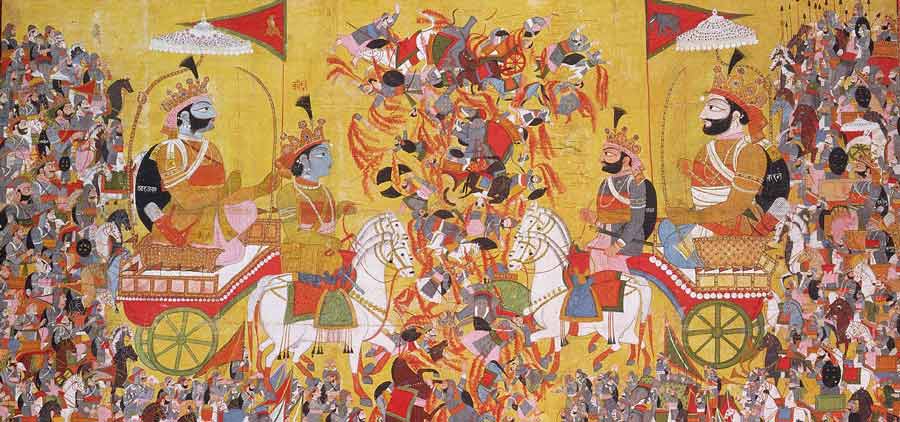
Arjuna and His Charioteer Krishna Confront Karna, circa 1820, unknown artist, Himachal Pradesh or Jammu and Kashmir
Ahiṁsā or nonviolence might seem an unlikely topic for one of the world's greatest war epics. Any student of Indian philosophy or religion undoubtedly associates
the Mahābhārata with Lord Krishna urging Arjuna to take up his weapons and fight and the bloodbath that
follows. And despite the attempts of Gandhi and many others to make the struggle between the Pāṇḍava brothers and the sons of Dhṛtarāṣṭra metaphorical, no
one can deny the reality of carnal savagery in the text, even on the part of the "good guys."
While on the one hand advocating strong action appropriate to one's station in life, the Mahābhārata also harbors myriad complementary views, acknowledging
the significant contributions of numerous "minority" positions and practices. Bhīṣma, the paragon of knowledge and the grand-uncle of the text's
protagonists, gives forth a wellspring of information about dharma on his deathbed of arrows. Within these discourses, several references are made to
nonviolence or harmlessness (ahiṁsā) at underscore its emerging importance as the prevailing virtue to be observed by
Brahmans and renouncers.
In the essay that follows, I will investigate three such instances within the Sānti Parvan and the Anuśāsana Parvan. The first takes the form of a story
that I will summarize. It includes reference to the tension between showy asceticism and a more measured form of spirituality. It includes extensive
descriptions of how animals are maltreated, and develops a rhetorical argument and appeal for observing nonviolent principles. The second example is a very
gracefully crafted summation of monistic philosophy through which one is encourged, by dint of seeing other as self, to treat the other as if it were one's
own self, and hence adopt nonviolent behavior. The third example advocates vegetarianism as the most obvious and appropriate modality for practicing
nonviolence.
A Nonviolent Tale
In response to a question by Yudhiṣṭhira regarding the nature of righteousness and dharma, Bhīṣma tells the tale of an encounter between a Brahman ascetic
named Jājali and a man named Tulādhara, a merchant (and perhaps a Jaina) Jājali had devoted years of his life to the most austere of penances: complicated
fasts, protracted periods of silence, and such utter disregard for his body that he no longer bathed and his hair became matted. During one particularly
stringent phase in the forest he abstained from all food and, while sustaining himself on air alone, he remained in a standing position, like a post, with
no movement whatsoever. A pair of Kulinga birds nested in his locks. Months passed. The birds mated, and from the eggs on Jājali's head, young birds
hatched and were nutured by their parents. Even after the birds had learned to fly, Jājali stood stationary. But finally, after they had fully matured and
abandoned their safe haven on his
head, Jājali allowed himself to rejoice, and proclaimed that he had won great merit by his noble deed, and that no one was his equal. The gods, however,
heard his boast, and a voice from the sky told him that his virtue and merit were surpassed by Tulādhara, a shopkeeper in the city of Banaras. Jājali then
went in search of this wise man and found him at his haberdashery. Tulādhara greeted Jājali knowingly, and told him that he knew of his austerities and
that he knew about the birds that had been born on his head. He also chided the Brahman for his pride, and asked how he might be of service to him.
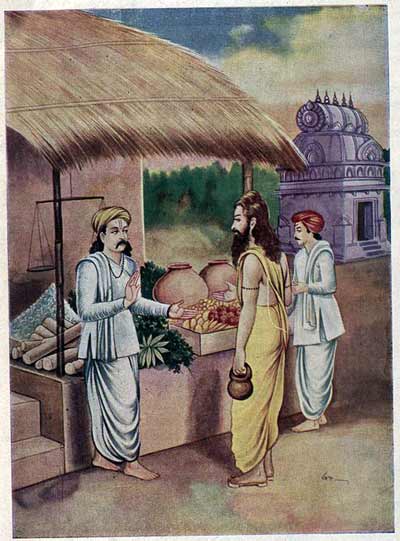
Sage Jajali is honoured by the Vaishya Tuladhara
by Ramanarayanadatta astri
Jājali, in the style of the Upaniṣads, asked Tulādhara to tell him of correct morality and the ways of knowledge. Jājali's response, in praise of
nonviolence, covers a wide range of issues. He replies that "harmlessness towards all creatures" is the highest morality. Because of his commitment to this
lifestyle, he says he never cheats anyone, never quarrels or hold grudges. Reminiscent of the Bhagavad Gītā, he proclaims "My scales are perfectly even, O Jājali, with respect to all creature…I cast equal eye upon all creatures…I see no difference
between a clod of earth, a piece of stone, and a lump of gold" (Ganguli:IX, CCLXII, 234). He claims that by following this vow, he has no fear of
creatures, nor do creatures fear him. He claims that speaking truth and by practicing the dharma of nonviolence, one enjoys even greater fruit than that
gained by sacrifices or penances. He criticizes those that castrate bulls and pierce their noses and force them to serve as beasts of burden. He claims
that "in every creature that is endued with the five senses live all the deities…The goat is Agni. The sheep is Varuna. The horse is Surya. Earth is the
deity Virat. The cow and the calf are Soma. The man who sells these can never obtain success" (Ganguli:IX, CCLXII, 236). He equates acts of injury done to
animals to abortion, and notes that Nahuṣa, who had both killed a bull and caused a foetus to abort, thereby brought diseases to creatures and was barred
from religious rites. He even condenms agriculture as harmful to creatures and the earth.
Jājali protests that Tulādhara's teachings run counter to the natural order of things, and that they seem quite heretical. Without the support of food, he
states, the world will come to an end. In response, Tulādhara states that nature provides abundantly. Appealing to a Golden Age of long ago, Tulādhara
tells of days when crops sprouted forth from the earth without cultivation. He assails the greed that has overtaken people and forced the proliferation of
needless and harmful rituals and sacrifices. He condemns covetous priests who assist at ceremonies for the "misguided" and have as their end material gain
rather than liberation. He urges using rice balls to replace animals at Vedic sacrifices. He also tells Jājali to give up his wanderings, to recognize that
"the Soul is itself a Tīrtha (sacred place)." Tulādhara then looks up into the sky and tells Jājali that the birds that currently circle overhead are the
very ones that he reared on his head far from this place. Jājali calls to them, and, at the close of the tale, the birds affirm Tulādhara’s teaching of
nonviolence as the true path of liberation.
This story of Jājali and Tulādhara, because of Tulādhara's profession as a merchant in nonviolent goods and his description of the uniqueness of each
living being, strikes one as theologically inspired by Jainism, which stems from India's early renouncer traditions. This is further supported by
Tulādhara's critique of farming and his insistence that animal sacrifice must be abandoned. Though Dumont has posited that the practice of nonviolence and
its attendant vegetarianism, was introduced into Hindu society from Buddhist and Jaina renouncers (Dumont: 149), this passage emphasizes the observance of
nonviolence by laypersons, and highlights a key theme of the Mahābhārata: the integration of highest spiritual values into daily life.
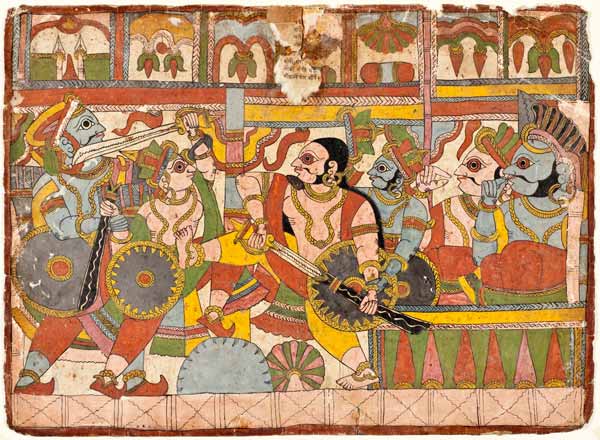
Arjuna Kicks Babhruvahana on the Chest for His Unheroic Act,
Babhruvahana Surrenders the Sacrificial Horse Syamakarna to His Father Arjuna, circa 1850, LACMA
Nonviolence as Unific Perception
The philosophy of harmlessness finds another form of expression later in the Mahābhārata. In chapter 113 of the Anuśāsanaparvan, Yudhiṣṭhira queries the
god Bṛhaspati, who happens to pass by Bhīṣma's bed of arrows. He asks the teacher of the gods which is best: nonviolence, Vedic observance, meditation,
restraint of the senses, austerity, or service to the guru? Bṛhaspati's reply, in keeping with Brahmanical monistic teachings in the Upaniṣads and Bhagavad Gītā, emphasizes seeing all things as oneself. It combines notions of self control, nonviolence, oneness, and
yogic samādhi into a unified practice and ideology. The chapter in its entirety follows:
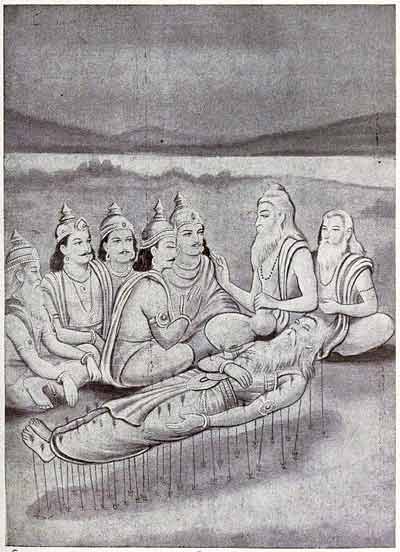
Bṛhaspati preaching Yudhiṣṭhira by Ramanarayanadatta astri
1. Yudhiṣṭhira said:
Nonviolence, Vedic dharma, meditation,
control of the senses, austerity, or service to the guru—
which of these is best for a person?
2. Bṛhaspati said:
All these in all ways are distinct doors of dharma.
Listen indeed, O Chief of the Bharatas,
as the six are praised.
3. Listen! I will speak of the unsurpassed,
the most excellent thing for a human:
the refuge of nonviolence,
the dharma that truly causes one to succeed.
4. The person who has always reflected
on the three faults inherent in all beings
and has controlled lust and anger attains success.
5. The one who abstains from using a stick
to kill helpless animals,
desiring the pleasure of the self, attains happiness.
6. That person who sees being as like his own self,
who casts aside the stick and whose anger is conquered,
prospers happily in the life to come.
7. Even the gods are bewildered at the path
of the one who seeks transcendence,
who regards all beings as similar to oneself.
8. It is best not to regard the other
as opposite from oneself.
The other stands in opposition due to desire.
This is the essence of dharma.
9. The person who sees all things as the self whether
in rejecting or giving, in pleasure or pain,
in the pleasant or the unpleasant, goes to samādhi.
10. "When a person moves with others,
a commonality is experienced.
Let them imitate this in the world of living beings;
by this skill, all dharma is taught.
11. Vaiśampāyana said:
Having spoken to the dharma King Yudhiṣṭhira,
the preceptor of the gods ascended to heaven
before our eyes.
This application of nonviolence, in addition to advocating abstention from hurting animals, emphasizes the adoption of a philosophical approach that sees
all beings as not different from oneself, not unlike the Golden Rule’s suggestion to treat others as if they were you. This text proclaims that
another person is similar to oneself, and must be treated accordingly.
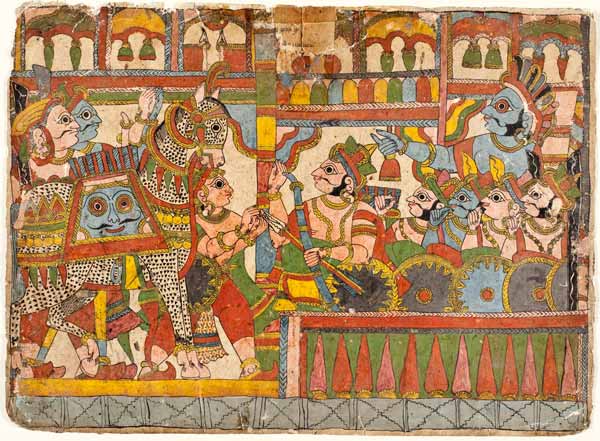
Babhruvahana Surrenders the Sacrificial Horse Syamakarna to His Father Arjuna, circa 1850, LACMA
Advocacy of Vegetarianism in the Mahābhārata
Having listened to Bṛhaspati's teaching on nonviolence, which uses terminology familiar within an Upaniṣadic and Brahmanical milieu, Bhīṣma then proceeds
to advocate various degrees of vegetarianism. As we will see in the next two chapters of the Anuśāsanaparvan, Bhīṣma condemns eating meat, saying that it
is like eating the flesh of one's own son. Yudhiṣṭhira raises the objection that the rules of funeral ceremonies mandate the eating of meat. In reply,
Bhīṣma appeals to Manu, who states that the vegetarian is the "friend of all living beings." He also cites the sages Nārada and Bṛhaspati, noting that both
praised restraint from eating meat After giving numerous other reasons for vegetarianism, Yudhiṣṭhira then acknowledges that Manu did assent to the use of
meat for ancestral ceremonies. However, he indicates that this is exceptional and not normative. Bhīṣma also suggests abstaining from flesh foods for fixed
periods, particularly when the moon is waxing in the month spanning September and October. He notes numerous warriors from the Mahābhārata who refrained from eating meat during this period, and rather like a contemporary beer commercial, claims that this
accomplishment caused them to be "encircled with beautiful women!" In conclusion, Bhīṣma notes that vegetarianism spares one from rebirth as an animal, and
states that it should be practiced by both renouncers and those active in the world. My translation of these chapters follows:
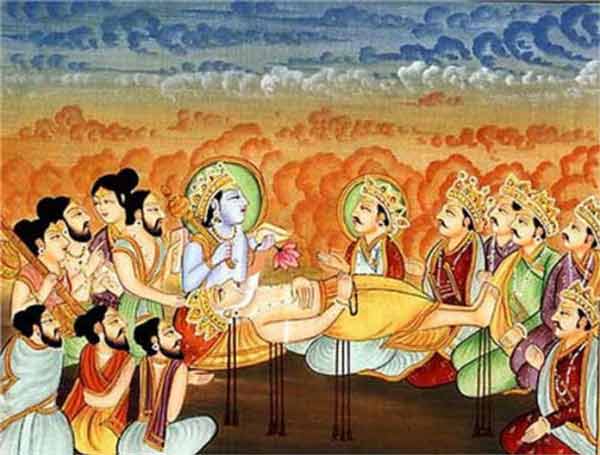
Bhīṣma and Yudhiṣṭhira, author unknown
XIII.115.
1. Vaiśampāyana said:
Then King Yudhiṣṭhira, again with great ardor,
said these excellent words
to the grandsire on the bed of arrows:
2. O great minded one,
the seers, the Brahmans, and the gods
praise the dharma known as nonviolence as being in accord
with the peerless authority of the Vedas.
3. By action, by speech, and even by thought
a man does violence, O Prince.
How then does he free himself from sorrow?
4. Bhīṣma said:
According to the Brahman spokesmen,
there are four specific nonviolence prescriptions.
If one of these is neglected,
there is none, O Destroyer of Foes.
[These four are not to commit violence oneself,
or to take what has been yielded by violence,
or pay someone to commit violence,
or to approve any violent act. See XIII:116:4.]
5. As all four legged animals
cannot stand with three legs,
so this indeed, O King,
is declared (inoperable) with three elements only.
[In other words, even if one abstains from three forms
of violence and practices only one, one is still deemed violent.]
6. Just as the tracks of a snake
and the footprints of other animals
are all covered over in the footprints of an elephant,
so in all worlds nonviolence
is proclaimed to be the highest dharma.
7. Indeed, by action, by speech, and by thought
(marked by violence), a living being can be tainted.
8. Of old it is heard that renunciation (of violence)
in thought, speech, and action, is the threefold advice
of the Brahmans.
9. Faults indeed are found in those
who have nonviolent thoughts and words but still taste meat;
the sagely ones, yoked with austerity,
do not ever taste meat.
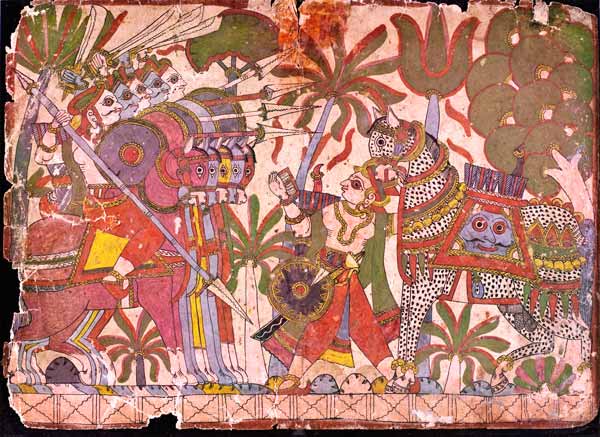
Babhruvahana Kills Animals to Save Syamakarna, Story of Babhruvahana, Mahabharata, circa 1850, LACMA
10. Hear me, O King, as I tell the faults of such eating.
The foolish one destroys life,
though it is like the flesh of one's own son.
11. Offspring are born
from the union of a mother and father.
Taste is born from the sensation of the tongue.
Hence, according to Śāstra, attraction should be held back
(so as not to lead to) savoring (meat).
12. Uncooked or cooked, salty or without salt,
when meats are found to be attractive,
then the mind becomes lost.
13. How indeed can lethargic, meat-eating men,
on their way to destruction,
hear the noise of the drum and conch,
the sound of the lyre's string?
[Meat eating renders one insensitive.]
14. Desirous of fruit, defeated by their eager longing,
they praise the taste (of meat)
as inconceivable, indescribable, and unimaginable;
these praisers of meat manifest the fruits of faulty karma.
15. In days gone by,
many noble men have renounced their lives,
have preserved the flesh of another with their own flesh.
16. Thus, Great King, nonviolence is accomplished
through four actions.
Nonviolence is explained to you
in accord with the purpose of all dharma.
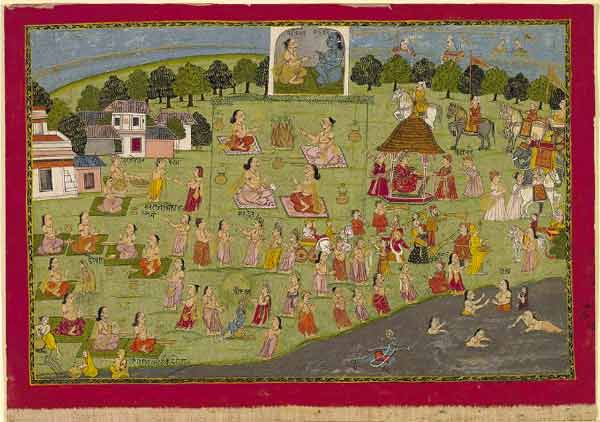
King Yudhisthira Performs the Rajasuya Sacrifice, 1825-50, Himachal Pradesh, Kangra Workshop
XIII:116:
I. Yudhiṣṭhira said:
"Nonviolence is the highest dharma:”
This has been said by you many times.
But also you have said that in funeral ceremonies
one desires food offerings for the ancestors.
2. You previously stated that the rules of funerals
dictate the use of meat. From where does this meat come?
Is not something hurt? This is inconsistent.
3. Our people doubt that dharma
is found in abstaining from meat.
What would be the fault of such eating?
What would be the virtue of not eating it?
4. What of the man who killed for food,
or (took something) killed by another,
or was killed for the sake of another
or bought it in order to eat?
5. I wish that this be thoroughly explained by you;
with certainty I want to perform this eternal dharma.
6. How does one attain long life?
How is one made strong?
How does one attain faultless limbs?
How is auspiciousness brought forth?
7. Bhīṣma said:
The eating of meat, O King, is against dharma,
O Chief of the Kurus.
Thus listen to me about the essence
of what one is enjoined to do.
8. Beauty, perfection of limbs, long life,
intelligence, lightness, accomplishment, memory:
nonviolence should be performed by those
self-disciplined men who desire such attainment.
9. There are many discourses on this topic
by the seers, O Chief of the Kurus.
Listen to what has been taught by them, Yudhiṣṭhira.
10. The one who, restrained by vows,
performs the horse sacrifice each month,
is equal to the one who shuns meat and honey, Yudhiṣṭhira.
(To eat honey was considered an act of violence because of
the numerous microscopic creatures thought to reside therein.)
11. The Seven Seers, the Bālakhilyas,
and the Marīcipas who have great wisdom
all praise abstention from eat, O King.
12. The sage Manu has said
that the one who does not eat meat
and does not kill nor cause killing,
is the friend of all living beings.
13. The one who refuses meat
is not overpowered by any beings and
is trusted by all that are born;
such a one should be eternally esteemed by Sādhus.
14. Nārada, the restrained one whose self is dharma,
has said that whoever wishes to increase his flesh
with the flesh of another falls into ruin.
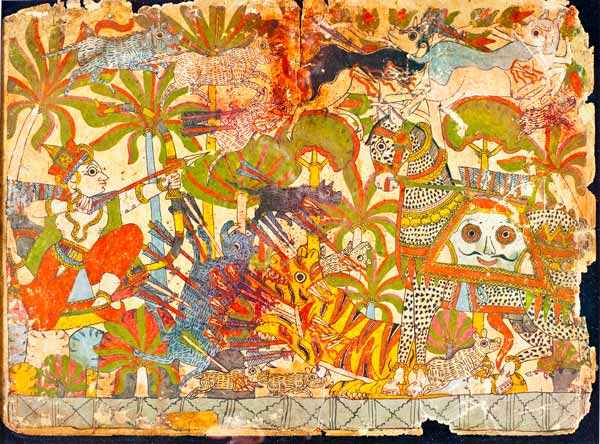
Babhruvahana Kills Animals to Save Syamakarna, Story of Babhruvahana, Mahabharata, circa 1850, LACMA
15. Bṛhaspati declared that the one
who restrains from meat and honey is distinguished
through austerity, giving, and sacrifice.
16. In my thinking, the one who performs
the horse sacrifice every month for a hundred months
is equal to the one who gives up meat and honey.
17. The one whose refuses meat and honey
is always regarded as a great doer of austerity,
always giving gifts, always sacrificing.
18. Having once eaten meat and then renouncing it
is better than all knowledge and all sacrifice, O Bharata.
19. It is known indeed that to refuse meat is difficult.
To hold this vow, by which all beings are made fearless,
is excellent.
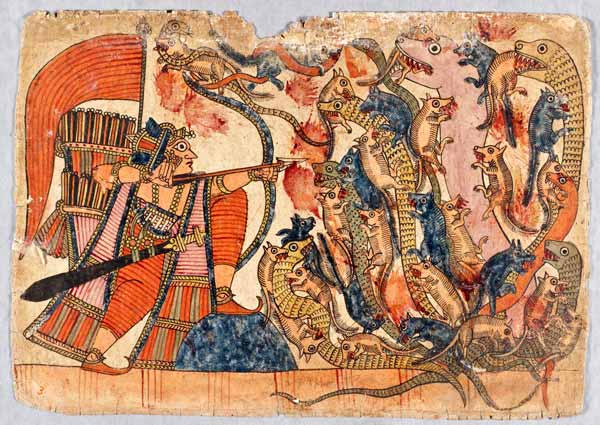
Fight of the Mongoose and the Serpent Armies, Scenes from the Story of Babhruvahana, Mahabharata, circa 1850, LACMA
20. That wise person who bestows
the gift of fearlessness on all creatures
is known in the world without doubt
as the giver of life.
21. The wise ones, who regard
the life of beings as their own breath,
praise this highest dharma.
22. In regard to the future, all selves are equal;
all have fear of death.
Through this insight of the great souls, it is said
that even the wise desire existence.
[See Yoga Sūtra II:9: Even the wise cling to life.]
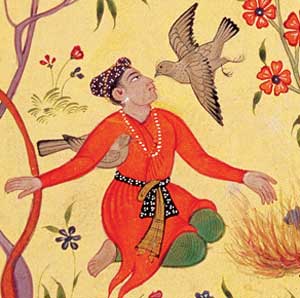
Painting of the Razmnama, commisioned by Akbar,
Mughal court 1598-99
23. What indeed can be the worth of a life
that carries on with the sin of subsisting on flesh,
killing those that are healthy and free of fault.
24. Therefore, O King, be enjoined to refuse meat;
this is the ancient high dharma
that brings heaven and happiness.
25. Nonviolence is the highest dharma,
nonviolence is the highest austerity,
nonviolence is the highest truth;
by this, dharma is done.
26. Meat is not born of grass, wood, or rock.
Meat arises from killing a living being.
Thus, in the enjoyment of meat there is fault.
27. The beloved, sincere, truthful gods
have in hand (for nourishment)
oblations, sacrificial offerings, and nectar.
(By contrast), consider the tortuous,
unrighteous ways of flesh eating demons.
28. O King, in not eating meat
one goes without fear in moonlight
or in the dreadfull, dangerous darkness
or in the twilight approach of night,
or in the crossroads or in assemblies of people.
29. If there were no meateaters,
there would be no killers.
A meat eating man is a killerr indeed,
causing death for the purpose of food.
30. If meat were considered not to be food,
there would be no violence.
Violence is done to animals
for the sake of the meat eater only.
31. Because the life or violent ones
is shortened as well (due to their deeds),
the one who wishes long life for himself
should refuse meat, O splendid one.
32. Those fierce ones who do violence to life
are not able to go for protection (when they need it).
The are to be feared by beings as beasts of prey.
33. From greed, or a deluded mind,
or for the sake of strength and vigor,
or from association with the sinful,
the opposite of dharma appeals to people.
34. The one who desires to increase
his flesh with the flesh of another
lives in entrenched anxiety
and is born here and there.
35. Those great vow-keeping seers have said
that those who do not eat meat are great,
are progressing to heaven,
and are bringing good fortune, renown, and long life.
36. This speech of Mārkaṇḍeya on the faults of eating meat,
O Son of Kuntī, was heard formerly by me:
37. "He who eats the flesh of living beings
who wanted to live but have been killed or have died,
that person himself indeed kills.
38. Purchasing, killing, eating are
the three means of obtainment.
The killer, with slaughter or snare,
has three means of destruction.
39. He who never eats meat but assents to it
is considered as having killed and is stained with fault.
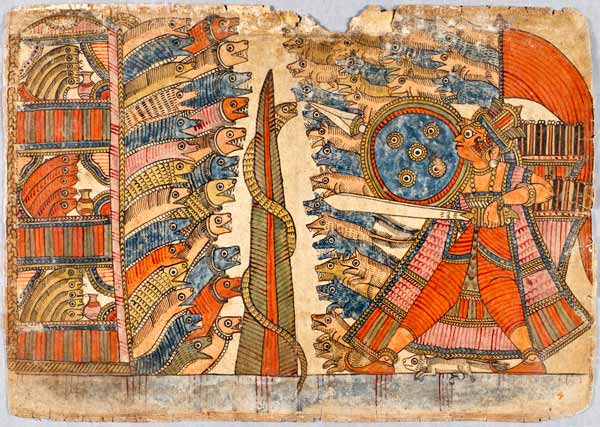
Fight of the Mongoose and the Serpent Armies, Mahabharata. circa 1850, LACMA
40. By not eating meat
and extending compassion to living beings
one is not assailed by any being
and attains long life and happiness.
41. It is said that the dharma of not eating meat
is always more distinguished
than gifts of gold, cattle, or land.
42. One should not eat unauthorized meat
carelessly at random.
Eating thus, a man goes to hell without doubt.
43. The notion that meat consecrated
at the pleasure of Brahman
will incur little fault is false indeed.
44. The one who kills beings
for the sake of food is the lowest sort of person,
a maker of great sin.
The eater is not (as bad as) the killer.
45. That ignorant man who by the ways
of performing prescribed rites and sacrifices
kill animals eagerly longing for their flesh
would indeed go to hell.
46. There is much good dharma for the one who,
having eaten llesh, holds back and abstains from this sin.
47. The ones who procure (meat) or approve of such action,
or who cut it up or cook or eat it or
any combination of these three are killers."
[End of Mārkaṇḍeya speech.]
48. I will now speak about another authoritative position,
fashioned by the honored ones,
established by the ancient seers in the beloved Vedas.
49. It is said, O most excellent of kings,
that dharma marked with activity and
overrun with concern for fruits
does not have liberation as its purpose.
50. Manu said that (meat) can be made pure through mantras
and oblations and consecration with water
according to the Vedic authority of ancestral ceremonies;
any other meat should not be eaten at pleasure.
51. According to injunctions of old, O King,
men are not to eat such meat.
Like demons, O Chief of the Bharatas,
they surely go to hell and infamy.
52. The man who wants to be
free from affliction in his self of self
should always shun the flesh of animals.
53. It is said that long ago
worshippers headed for the world or merit
by men's sacrifices of animals made of rice.
54. Long ago, the doubting seers
asked Vasu, the King of the Cedis (if he ate meat).
He said, "I don't eat meat.”
But, O Lord, he did.
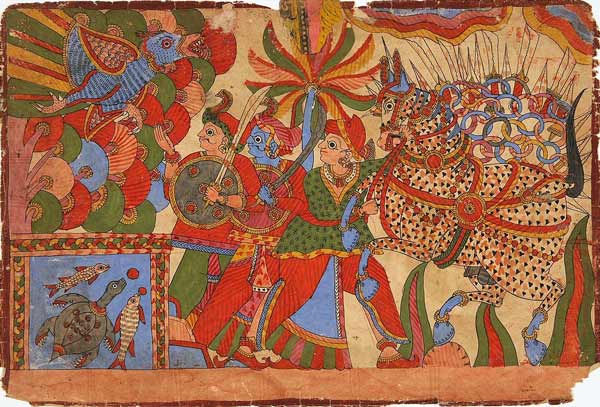
The horse Shyamakarna on the bank of Lake Dudumbhi,
by Jaimini illustrating Ashvamedha (Horse Sacrifice)
55. Having said that, the prince of earth fell
from heaven to the ground.
Having said it again,
he entered the surface of the earth.
56. The high souled Agastya,
through his desire to benefit human beings,
consecrated as deities all the deer of the forest
with his austerity.
57. For the one who has renounced meat
there is no advantage in resorting to the ancestors or gods;
the ancestors are pleased indeed
by the appropriate attitude regarding the pleasures of meat.
58. O King, listen as I recite this, O Faultless One:
Not eating flesh always brings happiness, O Sovereign of Men.
59. The one who would undergo
dreadful austerity for a full hundred years
and the one who would shun flesh
in my opinion are the same.
60. In the September/October month,
particularly during the fifteen days
of the moon's increase, O Light of Men,
one should shun all meat.
Thus dharma is bestowed here.
61. One who shuns meat
for the four months of the rainy season
obtains the four blessings
of fame, long life, mastery, and strength.
62. Or if one does not eat any meat
for just one month,
having crossed over all sorrows,
he would live in great pleasure.
63. There are those who abstain
from meat monthly or even half-monthly;
for those who have turned from violence,
the world of Brahman is revealed.
64. O Pārtha, those kings who abstain
from meat during the September/October month or half of it
see all beings as their own selves,
which is the traditional aim of knowledge.
65. Nābhāga, Ambariṣa, Great Souled Gaya,
Ayu, Anaraṇya, Dilīpa, Raghu, and Pūru,
66. Kārtavīrya, Aniruddha, Nahuṣa, Yayāti,
Nṛga, Vivagaśva, Saśabindu,
Yuvanāśva, and Sibi the son of Uśī,
67. Syenacirta, Somaka, Vṛka,
Raivata, Rantideva, Vasu, Sṛrñjaya, and
68. Duḥṣmanta, Karuṣa, Rāma,
Alarka, Nala, Virūpāśva,
Nimi, and Janaka the Wise,
69. Sila, Pṛthu, Virasena, Ikṣvāku,
Saṁbhu, Sveta, and Sagara,
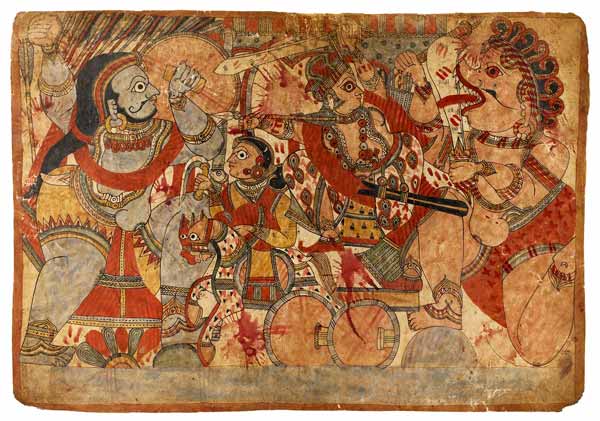
Babhruvahana Surrenders the Sacrificial Horse Syamakarna to His Father Arjuna. circa 1850, LACMA
70. as well as others, O King,
did not eat meat
during the month of September/October
and thereby attained heaven.
71. Surrounded with wealth,
they stand in the world of Brahmā,
adored by the Gandharvas
and encircled with beautiful women.
72. This nonviolence indeed is the highest dharma,
marked with purity.
Those great souled ones who follow this
dwell in the highest region.
73. Those who eternally abstain from meat and honey
are deemed bearers of dharma.
From birth onwards, these are happily
remembered as sages.
There is no doubt they attain distinction among kin.
74. Such a one is free from the afflictions of wild beasts,
free from the bondage of fetters,
free indeed quickly from the sorrow of disease,
free from unhappiness.
75. Such a man would not be born as an animal.
He would be handsome and intelligent indeed,
O Best of Kurus, and would obtain great fame.
76. This, O King, has been told to you
regarding abstinence from meat,
along with rules fashioned by seers
regarding both action in the world and renunciation.
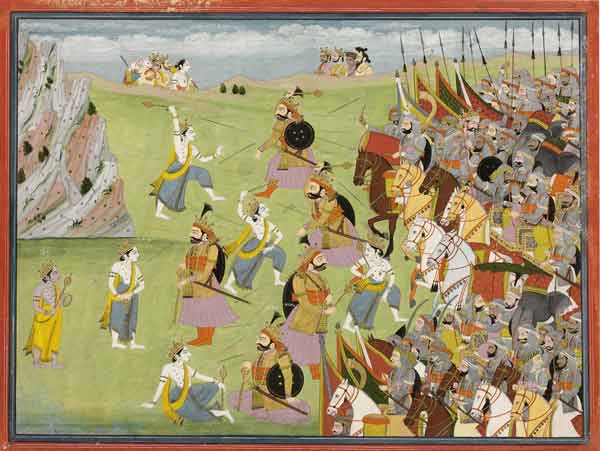
A painting from the Mahabharata Balabhadra fighting Jarasandha, LACMA
As evident from the wide range of materials included in these chapters, Bhīṣma regards the practice of vegetarianism to be a longstanding component of
Vedic religion. Not only are the names of the Seven Seers, Mārkaṇḍeya, Nārada, and others invoked in the name of forsaking flesh foods, Bhīṣma even
contradicts the great lawgiver Manu. However, he does retain a degree of flexibilty, assenting to the notion that even relatively short periods of
vegetarianism produce great merit.
In conclusion, these three Mahābhārata texts on nonviolence perhaps indicate a Jaina influence, present a
Vedāntic rationalization, and advance an enthusiastic embrace of vegetarianism within certain parameters. These passages indicate a respect for aspects of
Jainism that accord well with the this-worldly message of the Bhagavad Gītā. Specifically,
the story of Jājali and Tulādhara, advocates a strong yet spiritually disciplined laity. Within this cohort, renouncer values become integrated into
everyday life as indicated by Tulādhara's insistence on nonviolence (ahiṁsā) and truthfulness (satya) in all
aspects of his personal life and profession.
Bṛhaspati advocates a philosophical re-configuring of nonviolence. Rather than rooting nonviolence in the pluralistic Jaina theology of countless souls,
each of which must be respected in order for one to progress spiritually, he teaches a more mainstream Brahmanical interpretation of nonviolence based on
the perceived oneness of all beings. This move perhaps indicates that in accepting the nonviolence ideal, some modifications in terms of justification were
needed.
And finally, in his admonishments to Yudhiṣṭhira that vegetarianism ought to be observed, Bhīṣma modifies certain requirements, allowing for varying
degrees of stringency. Perhaps this indicates a certain political savvy on his part. By accommodating exceptions and limitations, the idea of giving up
meat might be made more palatable to a member of the warrior caste. This also indicates the dynamism of the Hindu tradition, which has consistently
exhibited a capacity to change and adapt to new cultural forms and the teachings of new gurus. In a certain sense, this modification of vegetarianism is
not unlike compromises made in the development of early Christianity, such as when Paul proposed a new orthopractic code that deemphasized food laws and
circumcision to encourage Gentile conversions.
It is perhaps helpful to recognize that nonviolence as conceived and actualized in this context differs significantly from its political applications as
preached and enacted by Henry David Thoreau, Leo Tolstoy, Mahatma Gandhi, and Martin Luther King, Jr. These latter interpretations seek to cultivate
nonviolent attitudes not only for self-edification but also for purposes
of social uplift. By contrast, the form of nonviolence advocated in the Mahābhārata does not lead to a slate
of pacifism or social activism, but remains concerned primarily with ritual purity. This is not to pass judgment or diminish its significance: matters of
diet and other such concerns
with orthopraxy are inherently inward-looking. However, it is important not to divorce practices that cultivate spiritual grounding from a concern with
societal issues. Though I know of no such formal studies, it might be the case that a land of observant vegetarians would be quite peaceful, as such
persons would be not be likely to promote violent behavior.
The Mahābhārata takes as one of its central themes the integration of highest dharma into the daily life of
the layperson. This theme extends into the Vaiṣṇava tradition, which actively supports vegetarianism and the adoption of other nonviolent behaviors. The Mahābhārata provides textual sanction for the practice of nonviolence, rooted in the teaching that life is
sacred in its distinct forms, and unified when seen as part of the spiritual essence that in Vedānta and Vaiṣṇavism is said to pervade all reality.